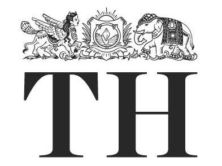
Wall Street Journal Europe.
The Wall Street Journal’s European edition published two articles in the past year because of its “relationship with a Dutch consultancy” firm called Executive Learning Partnership, Reuters reported.
The articles — from Oct. 14, 2010 and March 14, 2011 — both feature Executive Learning Partnership (ELP). The Wall Street Journal has since appended notes to both articles explaining that they were “written in connection with a now-expired agreement between the Circulation Department of The Wall Street Journal Europe and Executive Learning Partnership that wasn’t disclosed to readers.”
The Journal added that while the articles were written because of “the arrangement,” the final product was independent of the arrangement because the Circulation Department and ELP didn’t have any say. Further, the Journal noted: “Any action that creates an impression that news coverage can be influenced by commercial interests is a breach of the ethical standards of Dow Jones & Co.”
The Wall Street Journal’s European publisher, Andrew Langhoff resigned because of this arrangement, which was disclosed following an “internal investigation,” Reuters reported. The Wall Street Journal reported that the arrangement was discovered following a complaint from a “former Dow Jones circulation employee.”
According to Reuters and the Guardian, while Langhoff’s resignation memo suggested he was simply taking the fall for the arrangement, the Journal’s “internal investigation” determined Langhoff “personally pressured two reporters into writing articles featuring ELP.”
The Guardian noted that Wall Street Journal Europe and ELP are no longer in any arrangement.
The Wall Street Journal is owned by News Corp., parent company of News of the World, which closed amidst growing charges of phone hacking at the UK newspaper.
According to the Wall Street Journal’s article on the resignation, ELP “was a lead sponsor” of a Wall Street Journal Europe’ circulation department project until April of this year. The Wall Street Journal noted that Van Heck and Dow Jones wouldn’t provide more information on the contract.
The Guardian reported Oct. 12 that Langhoff’s resignation was in response to the newspaper’s “inquiries about a circulation scam” at the Journal. According to the Guardian, the Wall Street Journal reportedly was “channeling money through European companies in order to secretly buy thousands of copies of its own paper at a knock-down rate, misleading readers and advertisers about the Journal’s true circulation.” The newspaper reportedly would arrange to write about companies that would then buy super cheaply priced copies of the newspaper in bulk. Read more here.
The Guardian also claimed that a News Corp. “whistleblower” told Les Hinton about the situation, but Hinton “apparently chose to take no action” and the person was “made redundant.” Hinton was Dow Jones CEO until July 2011, when he resigned because phone hacking occurred when he was CEO of News International, as we previously wrote.
The Poynter Institute’s Steve Myers reported Oct. 12 that Dow Jones spokesperson Ashley S. Huston rejected the Guardian’s report on the so-called circulation scam, calling the story “inflammatory” and “replete with untruths and malign interpretations.” Huston is quoted as saying the person the Guardian called a “whistleblower” was “first investigated by the company because of concerns around his business dealings.” Huston went on to claim that the “circulation programs were fully disclosed and certified” and “common in the industry.” (Read Huston’s full statement here.)
However, the Wall Street Journal reported Oct. 13 with anonymous sources that the Guardian’s claim the newspaper sold 12,000 daily copies to Executive Learning Partnership “for just one European cent apiece” to boost circulation. The Wall Street Journal also noted that the “bulk-distribution deal…wasn’t disclosed to readers.”
According to an Oct. 13 Guardian article, the Audit Bureau of Circulations will be looking into the Wall Street Journal Europe’s circulation. The Guardian described that bureau as “the newspaper circulation watchdog.”






